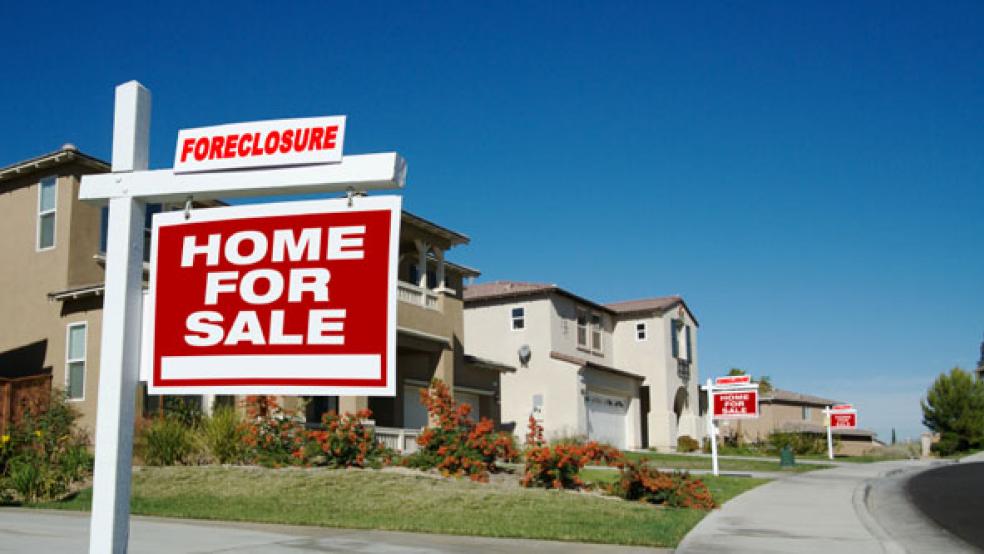Home foreclosures hit an all-time high in 2010, according to the latest report from RealtyTrac—and experts expect similar activity in 2011.
The housing market was rocked hard by the repossession of more than one million homes, setting a new record. “In terms of foreclosure activity, 2010 was a train wreck,” said Rick Sharga, president of RealtyTrac. “We continue to see unprecedented levels of foreclosures and bank repossessions. That is in spite of all of the programs that have been announced to try and remedy the solution. Maybe it was the year of unmet expectations.”
RealtyTrac counted a record 2.9 million foreclosures in its 2010 year-end report. Some 257,747 foreclosure filings were made in December alone; the year-end numbers are an increase of nearly two percent over 2009 and a 23 percent increase over 2008.
Foreclosure filings could have easily exceeded three million in 2010 had it not been for the fourth quarter drop—triggered primarily by the robo-signing scandal, which forced lenders to temporarily stop foreclosure proceedings, said James Saccacio, CEO of RealtyTrac. Foreclosures in the fourth quarter totaled 799,064, a 14 percent decrease from the previous quarter—the lowest quarterly total since the same time in 2008.
Thousands of robo-signers allegedly signed affidavits without reading them or having a notary present. These allegations forced banks to halt foreclosures while they conducted internal investigations.
“Huge Black Cloud”
Meanwhile, uncertainty threatens to stall a housing market recovery for at least another year or two, experts say.
“If people are reading every day about how bad the housing market is and how many people are losing their homes to foreclosure, it creates a huge black cloud over the whole housing market, which weighs heavily on attitudes,” said New York real estate expert Barbara Corcoran.
Housing starts also remain depressed and refinancing appears down—scary indicators of what’s ahead for this year. “Indeed, the decline in the housing market is a dagger pointed at the heart of an incipient economic recovery,” said Mort Zuckerman in an op-ed in today’s Financial Times. Yesterday, the Federal Reserve’s “beige book” noted that real estate remained a drag on the overall economic recovery, while most other sectors were expanding. Sharga, of Realty Trac, expects 2011 to be a peak year for foreclosures. Nearly 250,000 foreclosures that were delayed by banks in 2010 may now be rolled over into 2011.
He said 2010 was a shift from the first wave of foreclosures activity to the second wave.
This current wave, which took full force in 2010, was caused by a weak economy and high unemployment. Today, people are less likely to face foreclosure because of exotic loans, but because they no longer have a paycheck.
Still, some housing experts are optimistic, pointing to record low mortgage rates and bargain home prices. The 30-year fixed mortgage rate averages 4.71 percent, down from 5.06 percent at the same time last year. But it is expected to rise to 5.3 percent by year’s end, according to the National Association of Realtors. Additionally, home prices are expected to bottom out in the first half of the year, possibly dropping another five percent, experts say.
Peter Flint, president of the realty research firm Trulia.com, told CNBC yesterday that he thinks the real estate market is making a rebound. “We’re seeing year over year growth usage, which is not only encouraging for business but is higher than expected,” Flint said.
The usual suspects—Nevada, Arizona, and Florida—had the highest foreclosure rates in the country, RealtyTrac’s annual report said. And just five states accounted for 51 percent of the nation’s total foreclosure activity—California , Florida, Arizona, Illinois and Michigan. Together these five states accounted for nearly 1.5 million properties in foreclosure.
Related Links:
Housing Market Plunge Passes Depression’s (CBS News)
A Housing Rebound Won’t Lift the Economy (Bloomberg Businessweek)
The Politics of the Foreclosure Mess: Another Big Bank Bailout (Huffington Post)



